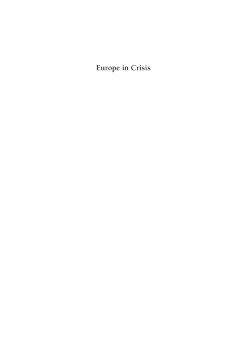
Additional Information
Book Details
Abstract
The period between 1917 and 1957, starting with the birth of the USSR and the American intervention in the First World War and ending with the Treaty of Rome, is of the utmost importance for contextualizing and understanding the intellectual origins of the European Community. During this time of 'crisis,' many contemporaries, especially intellectuals, felt they faced a momentous decision which could bring about a radically different future. The understanding of what Europe was and what it should be was questioned in a profound way, forcing Europeans to react. The idea of a specifically European unity finally became, at least for some, a feasible project, not only to avoid another war but to avoid the destruction of the idea of European unity. This volume reassesses the relationship between ideas of Europe and the European project and reconsiders the impact of long and short-term political transformations on assumptions about the continent’s scope, nature, role and significance.
Mark Hewitson is Professor of German History and Politics and Director of European Social and Political Studies at University College London.
Matthew D’Auria is Lecturer of Modern European History at the University of East Anglia.
“Overall…this collection offers a broad spectrum of intellectual historical research on Europe. It therefore does not only appeal to historians who are working on the history of images of Europe specially in the first half of the 20th century but also to all those who are interested in approaches and methods of Anglo-American intellectual historians.” · H-Soz-u-Kult
“…this unusually structured volume guides the reader to a number of promising and under-explored avenues in the field of European integration studies.” · English Historical Review
“One of the strengths of the volume is the conscious effort to pay close attention to the different debates and shifting discourses about Europe on their own terms over just a few decades…The absence of a one-size-fits-all analytical straightjacket allows the individual contributors to assess how these different ideas of Europe changed over time in myriad ways. By combining investigations of individuals with group portraits, the volume also makes certain features of the Europeanists stand out more clearly…[It] serves as a useful reminder that Europe during these 40 years, was a continent suspended between ancient roots and new beginnings.” · European Review of History: Revue europeenne d'histoire
“The contributions are of a high standard. In almost all cases there was much that is new and interesting. There is more than enough substance, interest and range for this to be an effective contribution.” · Peter Stirk, Durham University
“An excellent introduction to the history of the concept of ‘Europe’ that preceded the founding of the European Community in 1957. Spanning a wide range of authors and topics, it is essential reading for anyone interested in the intellectual history of European integration.” · Egbert Klautke, University College London
